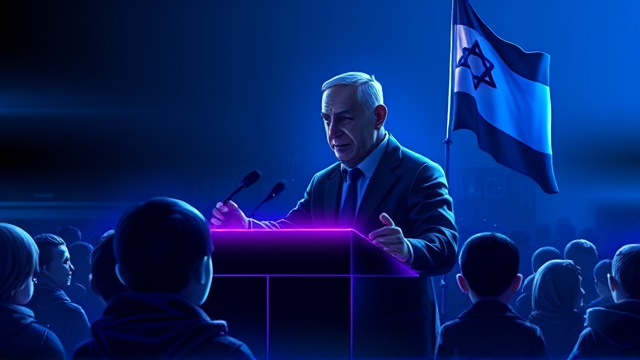Netanyahu Urges Unity as Hostage Release from Gaza Nears
In a moment of profound national consequence, Israeli Prime Minister Benjamin Netanyahu navigated the treacherous waters of domestic political schism on Sunday, acknowledging the fierce controversy surrounding his government's handling of the Gaza ceasefire agreement while simultaneously issuing a clarion call for unity as the long-awaited release of hostages drew near. The Prime Minister’s address, laden with the gravitas of a statesman confronting both a tactical victory and a strategic quagmire, sought to transcend the bitter divisions that have riven Israeli society, framing the imminent return of its citizens not merely as a diplomatic transaction but as a foundational moment for national renewal.'This is an emotional evening, an evening of tears, an evening of joy, because tomorrow our children will return to our borders,' Netanyahu declared, his invocation of a biblical verse echoing the deep historical and emotional currents that underpin the Israeli-Palestinian conflict, a conflict whose roots stretch back through decades of war, failed negotiations, and intermittent, fragile truces. His subsequent assertion—'Tomorrow is the beginning of a new path – a path of rebuilding, a path of healing and, I hope, a path of united hearts'—was a masterstroke of political rhetoric, reminiscent of Winston Churchill’s attempts to unify a beleaguered Britain during its darkest hours, yet it was delivered against a backdrop of intense scrutiny from both his right-wing coalition partners, who view any concession as a dangerous capitulation, and from the families of the hostages and their supporters, who have mounted sustained public pressure for a deal at almost any cost.This delicate balancing act is the latest chapter in a protracted saga that began with the devastating Hamas attacks of October 7th, a day that shattered Israel’s perceived security paradigm and triggered a massive military campaign in Gaza that has drawn international condemnation and placed Netanyahu at the center of a global geopolitical storm. The ceasefire deal itself, brokered through Qatari and Egyptian intermediaries with tacit support from the United States, represents a complex and fragile arrangement, one that exchanges a four-day pause in hostilities for the phased release of dozens of women and children held captive, while also allowing for increased humanitarian aid to flow into the besieged Gaza Strip, where the population faces a catastrophic humanitarian crisis.Analysts are already drawing parallels to historical prisoner exchanges, such as the 2011 deal for Israeli soldier Gilad Shalit, which saw the release of over 1,000 Palestinian prisoners, including the current Hamas leader in Gaza, Yahya Sinwar—a precedent that haunts current deliberations and fuels arguments about the long-term security implications of such swaps. The political calculus for Netanyahu is exceptionally perilous; his political survival depends on maintaining the support of hardliners like National Security Minister Itamar Ben-Gvir and Finance Minister Bezalel Smotrich, who have threatened to collapse the government if they perceive the military operation has been unduly weakened, while also addressing the overwhelming public desire to bring the hostages home.This internal pressure mirrors external dynamics, where the Biden administration, while publicly affirming Israel’s right to self-defense, has grown increasingly vocal in its calls for a more measured approach to minimize civilian casualties, a stance that reflects broader shifts in global opinion and the strategic concerns of Arab nations with which Israel has recently normalized relations. The coming days will test not only the mechanics of the hostage transfer and the durability of the ceasefire but also the very fabric of Israeli democracy, as it grapples with the fundamental questions of price, security, and national identity that this ordeal has forced to the fore. The path of 'united hearts' that Netanyahu envisions may prove to be the most difficult terrain of all to navigate, as the initial euphoria of reunion gives way to the sobering realities of a conflict with no clear endgame and a political landscape more fractured than ever.
Latest News
In a move that will undoubtedly be dissected by historians and political strategists for years to come, President Trump has formally signed a Gaza peace plan,
52 minutes ago0 comments
In a move that will be scrutinized by historians for its geopolitical weight, the initial phase of a Gaza ceasefire deal was formally signed in Sharm
57 minutes ago0 comments
The political foundations of Madagascar trembled this week as President Andry Rajoelina announced from an undisclosed safe house that he had survived a direct
1 hour ago1 comments
The scene was one of profound disarray, a stark contrast to the solemn dignity one expects when crossing the final threshold into American life.
1 hour ago1 comments
In a development that geopolitical risk analysts have been modeling for months, a significant hostage and prisoner exchange between Israel and Palestinian
2 hours ago1 comments
The political stability of Madagascar, an island nation perpetually teetering on the edge of crisis, has been violently upended.
2 hours ago0 comments
In a move that will be scrutinized by historians for its parallels to the grand diplomatic gambits of the twentieth century, President Donald Trump has
2 hours ago1 comments
In a high-stakes geopolitical maneuver that analysts are already comparing to a tense hostage exchange from a Cold War thriller, Israeli and Palestinian
2 hours ago0 comments
It’s quiet here...Start the conversation by leaving the first comment.
